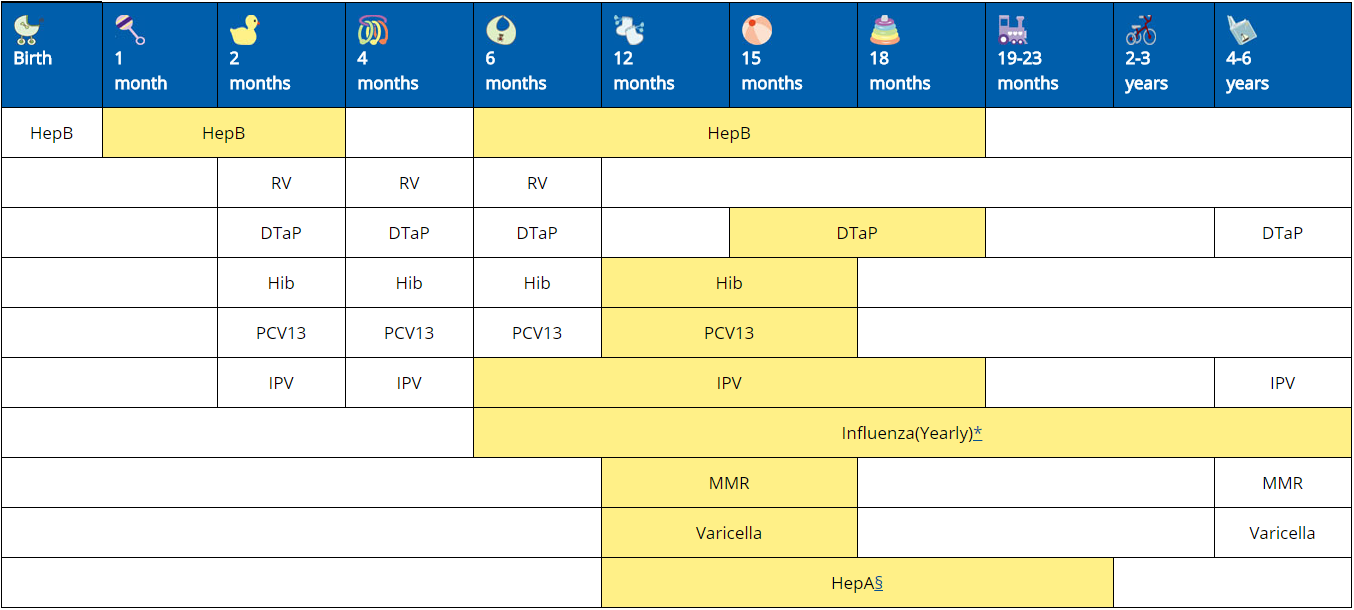As parents, you protect your baby from a number of things, from sharp corners in your home to sunburns at the park. You also protect their health by keeping up with doctor’s appointments, which sometimes involve receiving vaccinations. Children, from infancy to adulthood, have certain vaccines that are proven to prevent them from contracting potentially deadly diseases.
Dr. Tiffany Hill, pediatrician at UT Health East Texas, has some tips for parents who are hoping to learn more about the vaccination process.
Keep On Schedule
Like your baby’s naps, vaccines are arranged on a specific schedule. “The on-time administration of vaccines is the most effective way to prevent what in the past has been severe and fatal childhood illnesses,” says Dr. Hill. “Vaccines are timed to protect infants and children from diseases that occur in early childhood. Delaying any vaccine past the recommended administration date greatly increases the time that a child remains susceptible to the disease.” The amount of shots may seem like a lot, but this schedule is the only evidence-based schedule that has been tested and approved.
“Changing the schedule for fear of ‘overwhelming the immune response’ simply is not true,” says Dr. Hill. “The number of immunogenic proteins in vaccines today is significantly smaller than the number in naturally circulating organisms that infected children before universal vaccinations.”
To stay on schedule, refer to the CDC’s vaccination schedule. Your pediatrician should also provide a schedule as well as an immunization card that is updated with each vaccine given.

Know the Reactions
Infants have reactions to vaccines just like adults do. Talk to your pediatrician about the side effects prior to the administration so you know what to expect. Dr. Hill shared that the most common adverse reactions include redness or swelling at injection site and low-grade fever one to two days after the vaccine. Since some vaccinations can have side effects seven to 10 days later, it’s important parents are educated about each individual vaccine.
Knowing what side effects are typical will help you know when something is out of the ordinary. Dr. Hill explains when a parent should seek help. “Parents need to call immediately or be seen if the child has a high fever, is extremely irritable or lethargic, is having difficulty breathing or has a seizure. These more serious side effects are extremely uncommon with the present, more purified vaccines that are given today.”
Keep Positive
Parents often worry about the pain caused by receiving a shot, which can then affect how their child feels about vaccinations. Help create a positive environment for your child by following some tips.
Try these techniques during your child’s next vaccination appointment:
- Sing or tell a story.
- Bring out their favorite toy.
- Hold your child in your lap.
- Point out interesting things around the room.
- Make eye contact and smile.
If you are nursing, breastfeeding during a vaccination can be a great way to distract your baby and keep them comforted and calm. You may also ask your physician about topical anesthetics.
Stay Informed
It’s all right if you have a bunch of questions about your baby’s health when it comes to vaccines. Your pediatrician is there as a resource to answer all your questions and address your concerns. If you have all the information and can feel comfortable, then you’re able to help make your child’s vaccination process as easy as possible.
To keep up with the vaccination schedule and read about vaccination tips, visit the CDC’s parent vaccination site.
To find a UT Health pediatrician and make an appointment, call 903-596-DOCS.

Tiffany Hill, MD, is a board-certified pediatrician who sees patients at UT Health East Texas Physicians on Fifth Street in Tyler. “I believe in educating and informing parents on how to raise healthy children, both physically and emotionally, in a world of fast food, video games and social media.”
Dr. Hill explains how pediatrics is a special field because you get to create relationships with the entire family and become a part of the process of shaping and educating a child into an adult. “It is so wonderful to see a patient start to smile at his or her two-month visit and then receive a high school graduation announcement 18 years later.”
Dr. Hill applies her master’s degree in nutrition to promote healthy lifestyles and positive body image. She is fluent in English and Spanish, and enjoys treating children of all ages, but she especially enjoys treating and working with teenagers.

